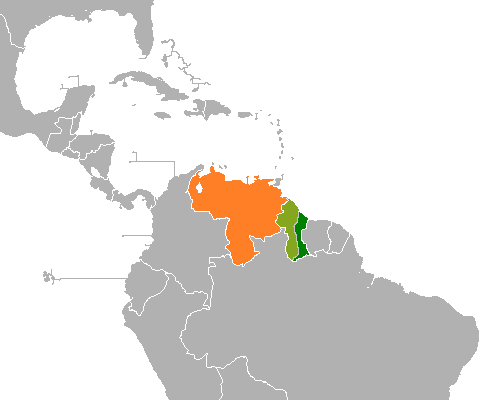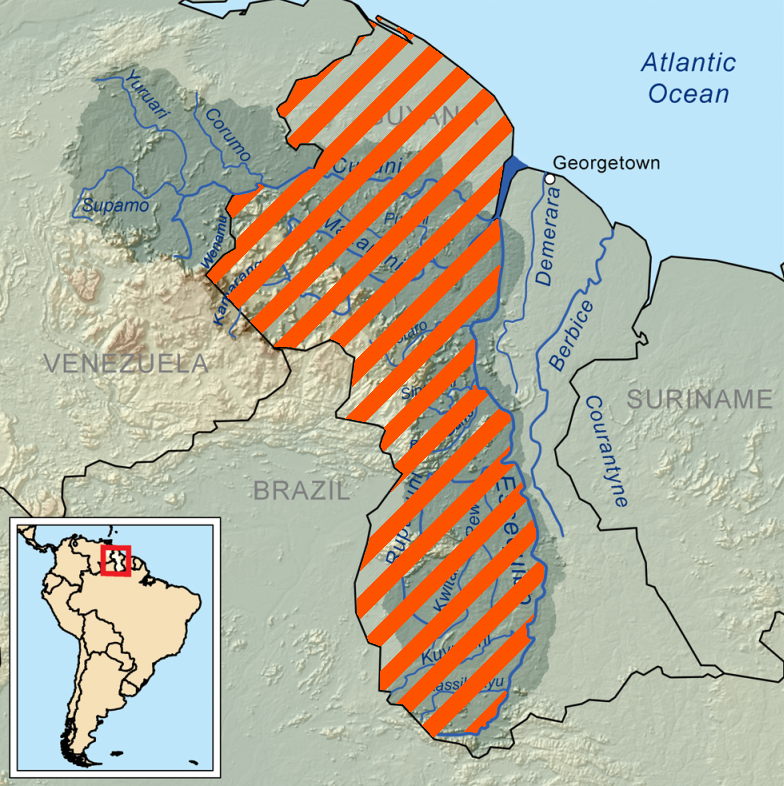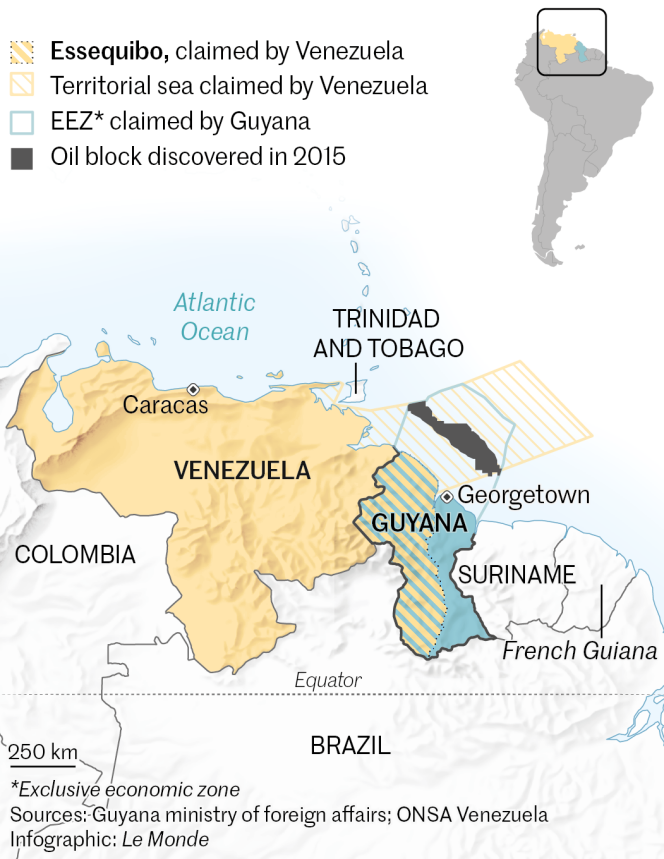Today, the Venezuelan people are asked to take part in a referendum on the Guayana Esequiba territory, a land mass of 160,000 km2 that is disputed between Venezuela and neighboring Guyana.
The population is asked 5 questions: Whether to reject the 1899 Paris Arbitration Award frontline between the two countries by “any means necessary”; to support the 1966 Geneva Agreement as the “only legal valid instrument” for a solution; whether to agree with rejecting the International Court of Justice’s jurisdiction over the issue; to oppose “by all means Guyana’s claim to unilaterally dispose sea pending delimitation; and the creation of a Guayana Esequiba state as part of Venezuela, including granting citizen cards to the inhabitants and incorporating the territory to Venezuela.
The territory in question is bordered with the Essequibo River, that in colonial times used to separate the Spanish and Dutch colonies. Hence, Guayana Essequibo, left of the river, was officially part of Spain. But the Dutch ceded the territory to Great Britain in 1814. The 19th century saw ongoing dispute over the territory between first Gran Colombia and later Venezuela on the one side and the British on the other.

In an interview to South American TV Channel TeleSUR, Delcy Rodriguez explains Venezuela’s position on the dispute and its global background. Rodriguez is Vice President of the Bolivarian Republic of Venezuela and President of the Special Commission on the defense of Esequibo.
Below we present excerpts from the interview.
Here in Venezuela, we say that Esequibo belongs to Venezuela. What exactly is the truth about the region?
The truth is that Venezuela was stripped of an important extension of its territory. Well, we were born with that territory, even in the formation as Captaincy General, that territory was part of Venezuela. It’s Venezuela.
It is a territory very rich in minerals, mainly gold. When they discovered immense gold resources there, explorers informed immediately the British crown. That crown appointed the Prussian Robert Hermann Schomburgk to draw frontier lines following the crown’s objective of appropriating that territory, a territory that never belonged to it, ever, because even when the Treaty of Tordesillas between Portugal and Spain, it belonged to Spain.
When Guyana became independent from the United Kingdom in the 20th century, they simply handed the territory over to them. Truth is that Esequibo never belonged to neither the United Kingdom nor Guyana.
How does Guyana argue in the dispute?
Guyana intends to validate the fraud that was consummated in the Paris arbitration award of 1899, it intends to validate it as a title, but it is unusual that fraud can generate rights.
(The arbitration occurred between Britain, the US and Russia with no participation from Venezuela nor Guyana, back then a colony. Venezuelan and international sources claim that the arbitration was less a legal judgement and more a diplomatic bargain between the parties, UWI.)

You know that the arbitral tribunal was made up of two Englishmen, two Americans and a representative of Tsarist Russia. Venezuela never participated in the ruling, nor did it participate in the Treaty of Washington of 1897, where the decision was taken in truth. If you will, this was the first application of the Monroe Doctrine, as a political agreement between the United States and Great Britain to take away the territory of Venezuela.
Venezuela did not take part in these negotiations due to domestic turmoil back then. The country was experiencing a truly weak internal situation and asked the international community for support. And that was the moment that they considered best to take over the territory.
More than 100 years later, in 2015, the Obama Administration started one of the most aggressive periods against our republic, with the illegitimate blockade against Venezuela. Their goal was again to cause internal weakness.
At the same time, Guyana started pursuing a sea delimitation on the ground of this 1899 arbitration. This time, ExxonMobil had discovered and announced huge oil reserves in the maritime zone of Esequibo.
Therefore, energy interests that are primarily present both in the territory in dispute and in the sea to be delimited are American interests and are mainly Western interests. So, we are really in the presence of a global war for energy resources.
US disrupts bilateral negotiations
The 1966 Geneva Agreement foresaw the solution of the conflict based on a consensus between Venezuela and Guyana. The Venezuelan government argues that this agreement made the 1899 Paris Arbitration null and void. Negotiations were ongoing, in good faith, until 2015, explains Rodriguez.
In 2015, with that decree, we observed a change in the position of Guyana, where leaders pursue an aggressive stance towards Venezuela. We cannot forget David A. Granger, President of Guyana back then, who said that Simon Bolivar is a thorn in Guyana’s throat.
Instead of bilateral negotiations and dialogue, decided to go to court, because ExxonMobil told them to do so. Let us not forget that ExxonMobil paid Guyana’s lawyers at the International Court of Justice, Guyana’s representatives got to the court by planes chartered by ExxonMobil.
Guyana started generating income from oil production in 2019. How much taxes do oil companies pay there? 1-2% And here in Venezuela? 30%. And remember that, especially in the interior of Guyana, there is extreme poverty. So, for whose benefit is Guyana’s exploiting the oil? Not for that of its own people – for that of transnational corporations.
Guyana has become a true colonial enclave, an imperialist conclave. Look at who its allies are Guyana conducts joint military exercises with the United States. Who supports Guyana and threatens Venezuela? The US Southern Command. Whom did Guyana call for support to stop our referendum? The Organization of American States, an organization whose history is full of coup d’états, assassinations, invasions into our Latin America and Caribbean.
International court “can’t decide” over Venezuelan territory
You are rejecting the jurisdiction of the International Court of Justice (ICJ) on the matter. Why?
The territory in question is Venezuelan. The referendum about it is a domestic issue, a right given by the Venezuelan constitution. The ICJ cannot intervene into domestic Venezuelan affairs. The ICJ cannot stop a consultative referendum within Venezuela.
In this case of the Esequibo, Venezuela has never recognized automatic jurisdiction of the ICJ over the issue – precisely because of the 1899 fraudulent arbitration. Here, the issue is about Venezuela’s territorial integrity, and Venezuela cannot be forced to accept any international judgment over it.

How do you see the stance of the domestic Venezuelan opposition on the issue?
This is a matter of the nation state. In the Barbados agreements between government and opposition, all parties agreed that this is a matter of national unity. There is a national consensus in the entire country and in all political fractions to defend the Esequibo.
How are you going to maintain Venezuela’s position facing powerful oil companies and their US allies?
Our constitution is very clear. Sovereignty resides in the people. And we are talking here of the territorial integrity of Venezuela. What comes out of the consultative referendum will be a mandate for the Bolivarian Armed Forces and for all institutions of the state.
At the same time, I call on the countries to raise their voices and ask for a negotiated solution. We must add voices to defend our Latin America and Caribbean as a territory of peace, because the real threat here comes from the powerful transnational corporations and from the United States government, from the Pentagon. There is huge money behind Guyana’s campaign.
It is a very serious position that Guyana’s says its not going to dialogue and to for a negotiated solution. They even prejudge the ICJ ruling by granting exploration rights to international corporations.
First, the land controversy needs to be solved, according to its solution, the sea delimitation. That is how to move forward. But Guyana is not paying attention to the Geneva Agreement.
The example of PetroCaribe
How can a solution be found that benefits both the Venezuelan and the Guayanese people, as well as the entire Caribbean?
This question is at the very heart of the issue. I repeat: Guyana I not working for its people, not for the Caribbean but for the transnational companies. I would like to see that the President of Guyana designs a program similar to PetroCaribe (regional oil production and procurement agreement between Venezuela and the Caribbean states, inaugurated by Hugo Chavez, that offered its members beneficial conditions, UWI). Remember that Guyana was also part of PetroCaribe and benefitted from it.
Even the World Trade Organization has acknowledged in its reports that PetroCaribe had very positive impact on the economic and social development of the region.
The referendum approves the integration of the current population of the Essequibo region and that they are automatically considered Venezuelans. How soon will that process begin after the vote?
This refers to the fifth question about the creation of the Guayana Esequiba territory that we can provide care to our population, because it is our population. This population can have comprehensive care, whoever wants to have their identity card has the right to get it and access social programs.
Do you have any idea how many Guyanese would like to be Venezuelans?
Not quite. But we know that poverty is rampant, and well, it is an area that must be given comprehensive attention.
Nor will we fall into provocations, our way out is peace. It has always been this way and our Bolivarian diplomacy is one of peace.

















Leave a Reply